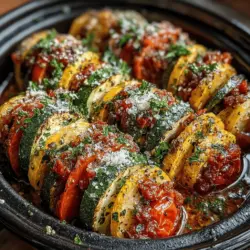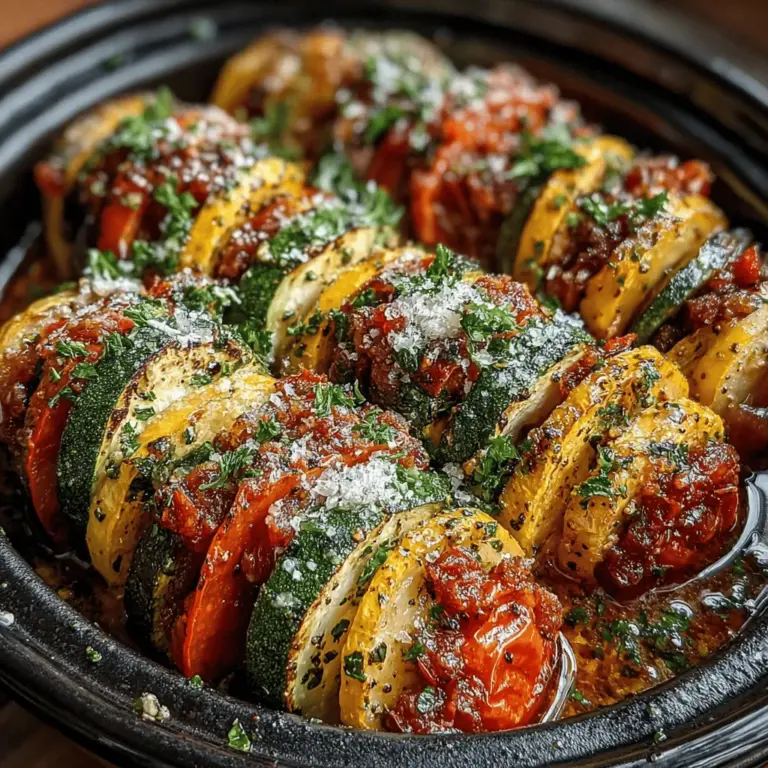Introduction to Rustic Ratatouille Delight
Ratatouille is a classic French dish known for its vibrant colors, rich flavors, and wholesome ingredients. This Rustic Ratatouille Delight takes a traditional approach and adapts it for a modern kitchen by utilizing a crockpot, making it not only easy to prepare but also a perfect dish for any occasion. Packed with fresh vegetables and aromatic herbs, this recipe is not only delicious but also incredibly healthy, bringing the essence of Mediterranean cuisine to your table. In this article, we will explore the delightful details of crafting this dish, its nutritional benefits, and how to serve it for optimal enjoyment.
Ingredients
– 1 medium eggplant, diced
– 2 medium zucchini, sliced
– 1 medium yellow squash, sliced
– 2 bell peppers (red and yellow), diced
– 1 large onion, chopped
– 4 cloves garlic, minced
– 1 (14.5 oz) can of diced tomatoes, with juice
– 1 teaspoon dried thyme
– 1 teaspoon dried oregano
– 1/4 cup fresh basil, chopped
– 1/4 cup olive oil
– Salt and pepper to taste
Instructions
1. Begin by washing all the vegetables thoroughly under running water.
2. Dice the eggplant, zucchini, and yellow squash into bite-sized pieces.
3. Chop the bell peppers and onion, and mince the garlic.
4. In a large bowl, combine the diced eggplant, zucchini, yellow squash, bell peppers, chopped onion, and minced garlic.
5. Add the can of diced tomatoes (with juice) to the vegetable mixture.
6. Sprinkle in the dried thyme and oregano, and season with salt and pepper.
7. Drizzle the olive oil over the vegetable mixture and toss everything together until well coated.
8. Transfer the mixture to a crockpot and spread it evenly.
9. Cover the crockpot and cook on low for 6-8 hours or on high for 3-4 hours until the vegetables are tender.
10. Stir in the fresh basil just before serving for an added burst of flavor.
Understanding Ratatouille: A Culinary Journey
Exploring the history of ratatouille
Ratatouille has its roots in Provençal cuisine, originating from the region of Provence in southeastern France. Traditionally, it was a peasant dish, utilizing seasonal vegetables that were abundant in local markets. Over time, ratatouille has evolved from a simple vegetable stew to a beloved symbol of French culinary artistry, often featured in gourmet restaurants and home kitchens alike. Its cultural significance in French cooking is profound, representing the essence of rustic and hearty Mediterranean fare.
The health benefits of ratatouille
Ratatouille is not only a culinary delight but also a powerhouse of nutrition. The primary ingredients are rich in vitamins, minerals, and antioxidants, making this dish a healthy choice for any meal. The vegetables used, such as eggplant, zucchini, and bell peppers, contribute essential nutrients that support overall health. Additionally, the inclusion of herbs and spices not only enhances the flavor but also adds health benefits, aligning with the principles of health-conscious eating and the Mediterranean diet, which emphasizes fresh produce and balanced meals.
Ingredients Breakdown: What Makes This Dish Special
Overview of the primary ingredients
– Eggplant: Known for its unique texture and ability to absorb flavors, eggplant adds a meaty quality to the dish.
– Zucchini and yellow squash: Both are low in calories and high in vitamins, providing essential nutrients without adding excess calories.
– Bell peppers: These colorful vegetables add a splash of sweetness and are high in vitamin C, enhancing the dish’s nutritional profile.
– Onions and garlic: The aromatic foundation of ratatouille, these ingredients not only provide flavor but also have anti-inflammatory properties.
– Diced tomatoes: Adding moisture and acidity, tomatoes are packed with lycopene, an antioxidant linked to numerous health benefits.
– Fresh herbs: Herbs like basil and thyme enhance the overall flavor and contribute additional health benefits, making this dish as nutritious as it is tasty.
Step-by-Step Guide to Preparing Rustic Ratatouille Delight
Prepping the vegetables for optimal flavor
To achieve the best flavor and texture in your Rustic Ratatouille Delight, proper preparation of the vegetables is crucial. Here are some tips for washing and cutting the vegetables:
– Wash all vegetables thoroughly to remove any dirt or pesticides.
– When cutting vegetables, aim for uniform sizes to ensure even cooking and consistent texture.
– For eggplant, consider salting the diced pieces for about 30 minutes to draw out excess moisture and bitterness before rinsing and adding to the dish.
– Slice zucchini and yellow squash into rounds or half-moons for a visually appealing presentation.
By following these steps, you can prepare a Rustic Ratatouille Delight that is not only delicious but also a feast for the eyes.

Tips for Perfecting Your Rustic Ratatouille Delight
Achieving Uniformity in Size for Even Cooking
To ensure that all the vegetables in your ratatouille cook evenly, it is crucial to chop them into uniform sizes. Aim for pieces that are about the same thickness—around half an inch works well. This consistency allows for even cooking, preventing some vegetables from becoming mushy while others remain undercooked.
Layering in the Crockpot: A Methodical Approach
When layering your ingredients in the crockpot, start with the sturdier vegetables like eggplant and zucchini, followed by the softer vegetables such as bell peppers and tomatoes. This method not only aids in cooking but also enhances the infusion of flavors. Each layer should be seasoned lightly before adding the next to build depth in taste.
Importance of Layering for Flavor Infusion
The way you layer your ingredients impacts how flavors mingle during cooking. The bottom layer benefits from the heat and moisture, allowing it to absorb the flavors of the layers above. This process creates a harmonious blend of tastes that is the hallmark of a great ratatouille.
Seasoning to Perfection
The Role of Olive Oil in Flavor Enhancement
Olive oil is not just a cooking medium but a crucial element in flavor enhancement. Use high-quality extra virgin olive oil to sauté your vegetables initially, as this will impart a rich, fruity flavor to the dish. Drizzling a bit more olive oil before serving can also elevate the overall taste.
Understanding the Balance of Herbs and Spices
A well-balanced mix of herbs and spices is essential to create a delicious ratatouille. Traditional herbs like thyme, basil, and oregano work beautifully, but don’t hesitate to experiment with your favorites. Remember to taste as you go to adjust the seasoning according to your preference.
Cooking Methods: Low and Slow vs. High Heat
Benefits of Slow Cooking for Flavor Development
Cooking your ratatouille on low heat allows the flavors to develop slowly, creating a deeper, more robust taste. The vegetables will soften and meld beautifully, leading to a dish that is rich in flavor and texture.
Timing and Temperature Considerations
If you’re short on time, you may opt for a high-heat method; however, be cautious of overcooking. Aim for a cooking time of about 4-6 hours on low or 2-3 hours on high in the crockpot. Keep an eye on the vegetables to ensure they retain some texture.
Incorporating Fresh Herbs: Timing is Key
Why Adding Herbs at the End Preserves Their Flavor
Fresh herbs should be added toward the end of the cooking process to preserve their bright flavors and aromatic qualities. Stir them in just before serving to maintain their integrity and prevent them from wilting too much.
The Impact of Fresh Herbs on the Dish’s Aroma
The addition of fresh herbs can significantly enhance the aroma of your ratatouille. As they are added at the end, their fragrance will waft through your kitchen, inviting everyone to the table.
Serving Suggestions for Rustic Ratatouille Delight
Plating the Dish Beautifully
When serving ratatouille, consider presentation to elevate the dining experience. Use a shallow bowl or a large platter to showcase the vibrant colors of the vegetables. Garnish with a sprinkle of fresh herbs or a drizzle of olive oil for an inviting look.
Choosing Appropriate Serving Dishes
Opt for rustic, earthy-toned dishes that complement the Mediterranean essence of ratatouille. A wooden cutting board or a cast-iron skillet can also add to the charm when serving family-style.
Pairing Options: What Complements Ratatouille?
Suggestions for Side Dishes: Crusty Bread, Rice, or Pasta
Rustic ratatouille pairs wonderfully with crusty bread for dipping, creamy risotto for a hearty meal, or pasta for a comforting dish. Each option enhances the flavors of the ratatouille while offering a satisfying texture contrast.
Beverage Pairing Ideas: Wines and Non-Alcoholic Options
For wine enthusiasts, a light-bodied red like Pinot Noir or a crisp white such as Sauvignon Blanc will complement the dish beautifully. If you prefer non-alcoholic beverages, consider herbal iced tea or sparkling water with a hint of lemon.
Conclusion: Savoring the Experience
Rustic Ratatouille Delight is more than just a meal; it embodies a celebration of fresh, wholesome ingredients and the joy of cooking. Its vibrant colors and rich flavors will not only satisfy your taste buds but also nourish your body. Whether enjoyed on its own or paired with your favorite accompaniments, this dish brings the warmth of home-cooked French cuisine to your dining table. By embracing the simplicity and healthfulness of ratatouille, you can elevate your culinary repertoire and share a piece of Mediterranean tradition with family and friends.

